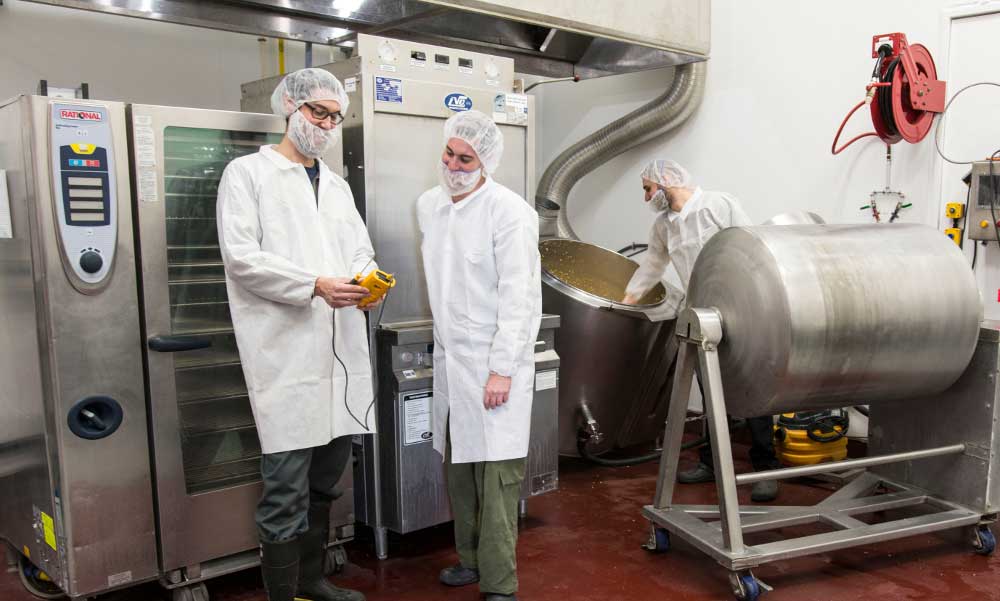
Ontario company prepares to launch ready-made tempeh
Bioenterprise expertise and funding support play key role
By Lilian Schaer
Rapidly growing interest in plant-based proteins and the trend toward clean, healthy eating is spelling opportunity for a Kitchener food company that is preparing to add a new product to its offering.
Henry’s Tempeh has been producing their gut-health friendly, fermented food product since 2002, using locally grown non-GMO certified organic Ontario soybeans. Fermentation makes foods easier to digest, breaking down proteins into more basic amino acids that can be more readily absorbed by the human body, and tempeh is a staple in Indonesian cuisine.
“Demand is wild, and it’s been like that for the last five years,” says Henry’s Tempeh President Jason Jurchuk. “And even though the market itself has expanded, household penetration is still less than one percent, so as that increases, there is a lot of potential for us to grow.”
Their tempeh product offers a source of complete protein comparable to chicken or beef, with a shelf-life of up to four months, making it convenient to use in a range of recipes as a plant-based protein ingredient.
Tempeh is still an unknown for many consumers, though, who are unfamiliar with the product and are either unsure what to do with it or cook it poorly and give up on it.
Solving that problem is the goal of the company’s latest product, a pre-seasoned tempeh that is ready to cook or eat right out of the package. According to Jurchuk, support from Bioenterprise, Canada’s Food & Agri-Tech Engine, has been instrumental in making that happen, including networking support and a grant from the SmartGrowth fund the organization administers.
“They’ve provided funding but have also offered services that we can call on,” explains Jurchuk. “They matched us with experts in the industry to help us frame the market, refine the recipe and figure out aspects of manufacturing, shelf life and packaging design that have been essential to making the new product happen.”
As Canada’s Food & Agri-Tech Engine, Bioenterprise brings more than 15 years of industry experience and a national and international network of research institutions, academia, mentors and experts, funders and investors, government, and industry partners to help small and medium-sized businesses in the agri-food sector nationwide connect, innovate, and grow.
A ready-made product has been on the Henry’s Tempeh wish list for some time. Previously, though, their R&D capacity would quickly be sidelined whenever the company landed a new account. Bioenterprise’s support and an expansion of their HACCP-certified facility that doubled their space has finally given that dream the momentum it needed to become a reality, with Jurchuk hoping to launch early market trials shortly.
“We’ve invested heavily in automation as well, with a number of industry firsts in the process developments we’ve made. This also lets us focus more on new product development because we are more efficient,” he adds.
Henry’s Tempeh products are currently available in Metro, Farm Boy, Food Basics, and Whole Foods locations as well as smaller food retailers and health food stores from Manitoba to the Maritimes. The company also had a thriving food service market, which saw a steep decline at the onset of the COVID-19 pandemic, but Jurchuk notes that was offset by a big increase in their retail sales.
Another important aspect of their business is a focus on sourcing as much of their ingredients as possible from Ontario or Canada, especially the soybeans that serve as the base of their product. One ingredient currently still comes out of the U.S., but work is underway with an Ontario company for a local solution.
Henry’s Tempeh was originally established in 2002. Jurchuk and business partner Phil Diceanu both worked for the company before eventually also becoming its owners. With a team of 11 employees and a growing product line driven by consumer demand, the future looks bright as Henry’s Tempeh’s 20th anniversary approaches next year.
“We’re hoping to have a couple of ready-made products on the market and hopefully too be working on some other new product ideas as well,” Jurchuk says.
Bioenterprise, Canada’s Food & Agri-Tech Engine, has just closed the application process for the second round of its SmartGrowth Program from southern Ontario companies in the agriculture, agri-food, or agri-technology sectors to access funding and mentorship support services. The next intake period is scheduled for January 2022.
For more information, visit https://bioenterprise.ca/programming/bioenterprise-smartgrowth-program/ or contact Alexandra Coccari at alexandra.coccari@bioenterprise.ca.
-30-
Not yet following us on social media? Follow Bioenterprise on Twitter, LinkedIn, TikTok, and subscribe to our YouTube channel for industry news, events, and business development opportunities.